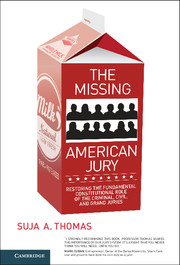 The Missing American Jury
The Missing American Jury Book contents
- Frontmatter
- Contents
- Acknowledgments
- 1 The Missing American Jury: An Introduction
- PART I The Jury Now
- PART II The Future Jury
- 4 Interpreting Jury Authority
- 5 Restoring the Jury
- 6 Beyond the Constitution: Affirming a Role for Lay Jurors in America's Government and World-Wide
- 7 A Branch Among Equals in American Democracy: A Conclusion
- Index
5 - Restoring the Jury
from PART II - The Future Jury
Published online by Cambridge University Press: 05 June 2016
- Frontmatter
- Contents
- Acknowledgments
- 1 The Missing American Jury: An Introduction
- PART I The Jury Now
- PART II The Future Jury
- 4 Interpreting Jury Authority
- 5 Restoring the Jury
- 6 Beyond the Constitution: Affirming a Role for Lay Jurors in America's Government and World-Wide
- 7 A Branch Among Equals in American Democracy: A Conclusion
- Index
Summary
Despite the popular image of the American jury and the power possessed by the English jury of our origins, the jury in the United States exercises almost no authority today. It occupies this place even though it was to serve a fundamental role in the checks and balances of the American government established by the Constitution. This chapter addresses how this constitutional role can be restored.
Chapter 4 described how the jury provisions should be interpreted. First, the Seventh Amendment requires the civil jury's authority and the related powers of the traditional actors, including the judiciary, to be governed by the substance of the late eighteenth-century English common law jury trial. Second, because the powers of the criminal and grand juries depend solely upon the traditional actors – who can usurp their authority – the traditional actors’ powers in this context must also be restrained in relationship to jury authority. The competing incentives of the traditional actors and their abilities to take criminal and grand jury authority make originalism – primarily, the late eighteenth-century English common law jury trial – the logical reference point limiting the traditional actors’ authority. Moreover, due to these relationships, when either actor could arguably possess authority, deference to the jury's competing authority is necessary.
Using the mechanism of originalism, this chapter takes an in-depth look at four major modern procedures that affect jury authority. This analysis shows how they appropriate power from the jury and consequently, how their elimination would help restore the jury. The discussion begins with procedures in criminal cases that shift significant authority to the government. First, a judge's power to free a person whom a jury has found guilty of a crime is considered. Next, the examination turns to a state's authority to prosecute an alleged criminal without a grand jury deciding that the government's case should proceed. This power is particularly potent because the state almost invariably leverages a plea, resulting in a jury never deciding the fate of the accused. After a look at these weighty criminal procedures, the chapter focuses on two civil mechanisms that give the government significant authority where plaintiffs allege defendants committed wrongs. First, Congress's decisions to give judges, instead of juries, certain cases with damages or fines are discussed.
- Type
- Chapter
- Information
- The Missing American JuryRestoring the Fundamental Constitutional Role of the Criminal, Civil, and Grand Juries, pp. 147 - 186Publisher: Cambridge University PressPrint publication year: 2016


